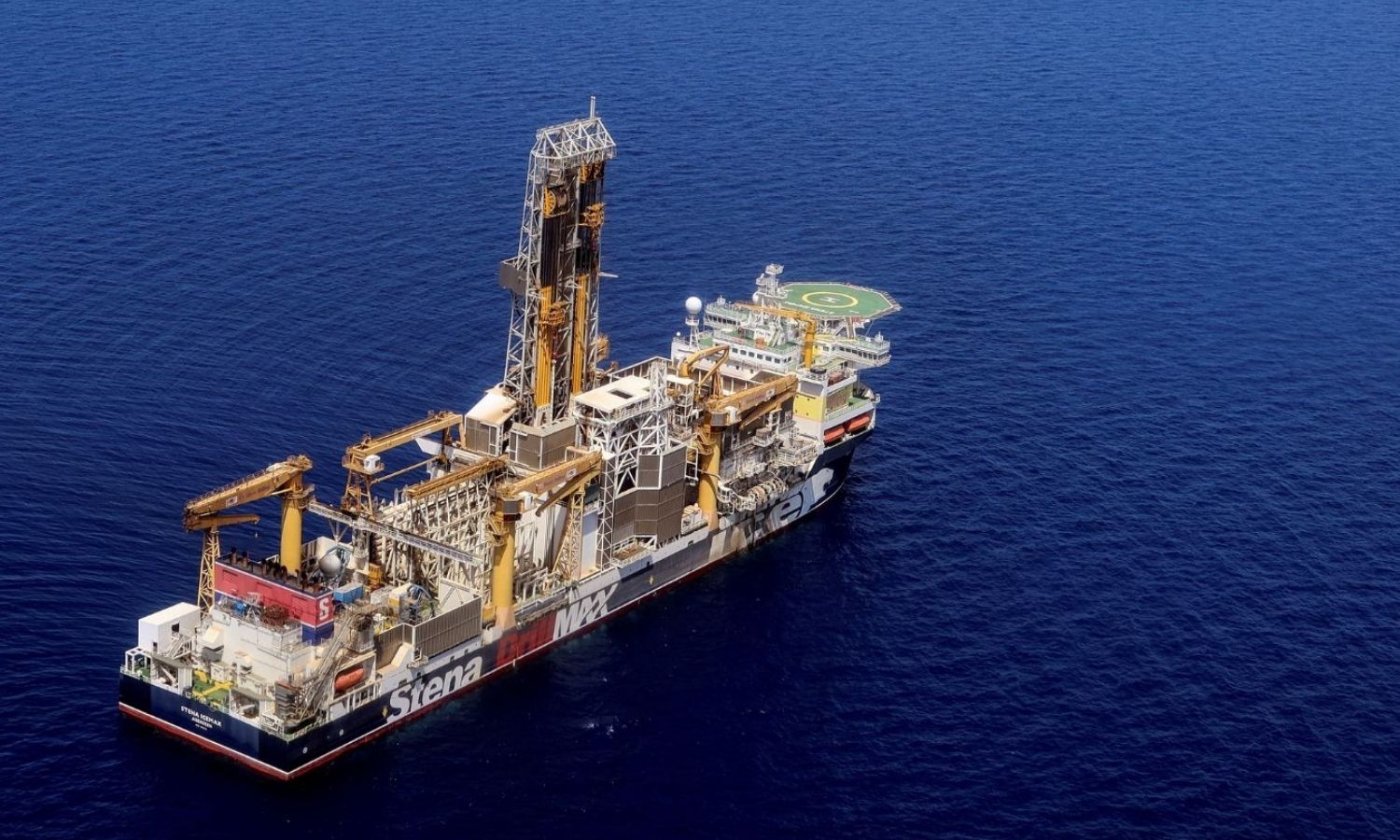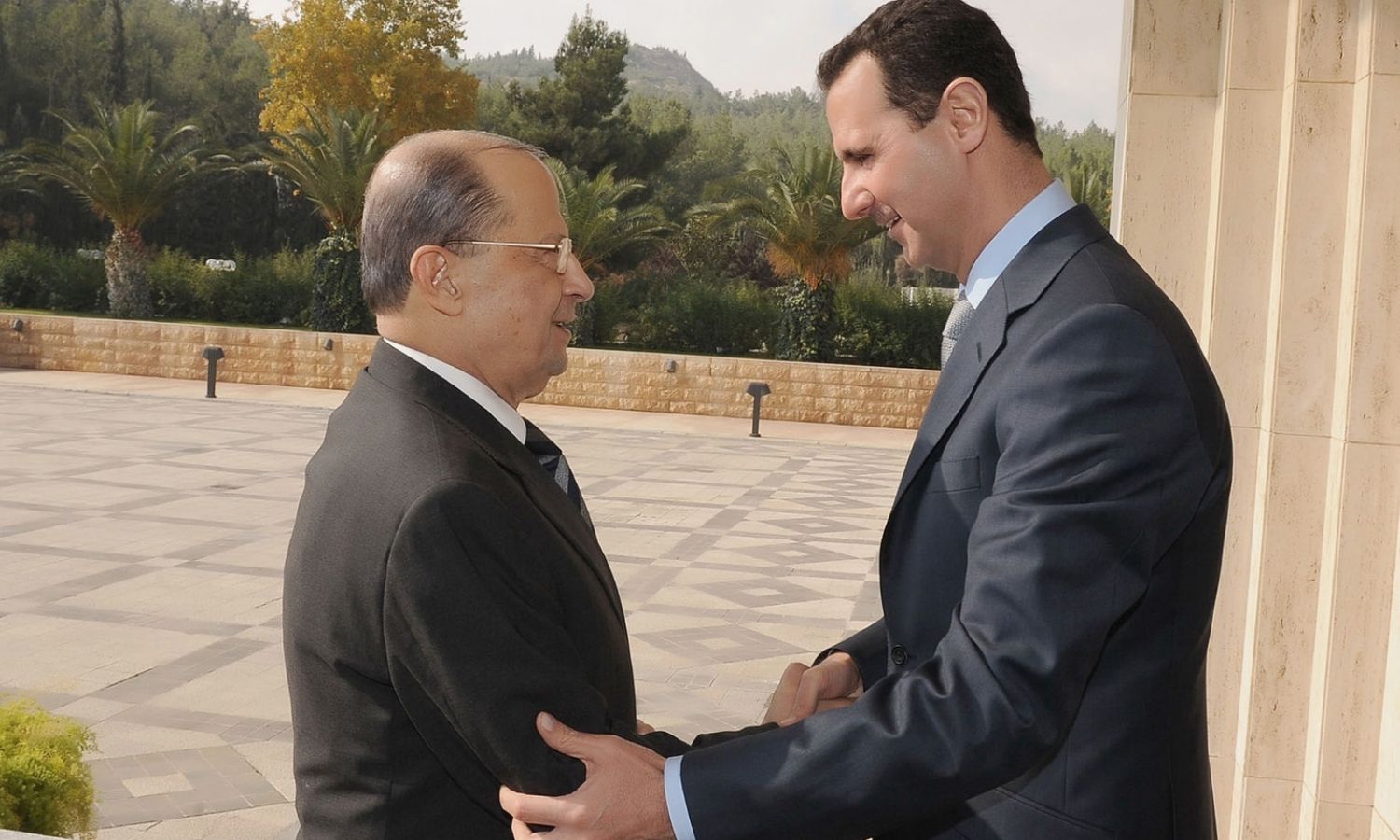



Enab Baladi – Muhammed Fansa
There has been no change in the maritime demarcation file between Lebanon and Syria since it was last submitted before the end of the former Lebanese President’s mandate, Michel Aoun. In light of the official media’s disregard for the issue, the question arises as to why the Syrian regime has not opened the file.
Although the desired economic benefits of maritime boundary demarcation were mentioned, as when the demarcation agreement between Lebanon and Israel was signed, the regime showed no acceptance towards a neighbor demonstrating enthusiasm to close the file, as it initiated a refusal justified by the former Syrian ambassador to Lebanon by a “full agenda.”
On 24 October, the former Lebanese president mandated a delegation to visit Syria to discuss the issue of maritime delimitation between the two countries, headed by the Deputy Speaker of the Parliament of Lebanon, Elias Bou Saab. The delegation also included the Lebanese Minister of Foreign Affairs, Abdallah Bouhabib, the Minister of Public Works and Transport, Ali Hamieh, and the Director of the Lebanese General Directorate of General Security, Major General Abbas Ibrahim.
After Damascus apologized the following day for not receiving the Lebanese delegation because of “prior engagements,” the former Syrian ambassador to Lebanon, Ali Abdul Karim, said after meeting the previous Lebanese president that “confusion had occurred in contact between presidents Aoun and al-Assad about the date of the delegation’s visit to Damascus.”
He added that the meeting had not been canceled “but rather postponed due to the lack of availability on the Syrian side,” while no new date has been set for receiving the Lebanese delegation yet.

Lebanon’s former President, Michel Aoun, on a previous visit to the Syrian regime’s president, Bashar al-Assad – 3 December 2008 (Reuters)
In 2005, Norwegian company INSEIS conducted a two-dimensional (2D) seismic survey in agreement with the Syrian Petroleum Company, which included 5000 linear kilometers and covered an area of 10,000 square kilometers. In 2011, the French company CGG Vertitas, which acquired INSEIS, released its report on this survey.
The report stated that “Offshore Syria is a geologically complex area, situated above the plate tectonic boundary between the African and Eurasian plates.” The report confirms the existence of three sedimentary basins in the Syrian coast and that the results of the survey are “encouraging” with oil and gas reservoirs.
The US Geological Survey estimated a mean of 1.7 billion barrels of recoverable oil and a mean of 122 trillion cubic feet of recoverable gas in the eastern Mediterranean Basin. This includes the Levantine Basin Province off the coasts of Syria, Lebanon, and Israel.
Although being the competent body in the oil and gas file, the Syrian Ministry of Oil and Mineral Resources does not provide confirmed or foreseeable information on exploration in the eastern Mediterranean off the Syrian coast, while the state-run al-Thawra newspaper indicated in 2013 that the area of the Syrian part of the eastern Mediterranean basin is estimated at 6.5% of the total basin area.
The newspaper mentioned that the Syrian regional and exclusive economic zones are “promising” and that there is hope for discovering gas in the southern part and oil in the northern part.
At the time, the newspaper reported that exploration would take place in Sea Block No. 1 within the Syrian Exclusive Economic Zone (EEZ) in the Mediterranean Sea, off the coast of Tartus governorate up to the southern Syrian-Lebanese maritime border, with an area of 2250 square kilometers.
Accordingly, the aforementioned marine area intersects 750 square kilometers, which Lebanon considers among its exclusive economic zone.
The Syrian gas file is accompanied by official ambiguity regarding the offshore gas reserves and contracted companies and the results of their work, with only frequent declarations of promotional oil discoveries.
The economic and political analyst in Middle Eastern affairs, academic Mohammad al-Futaih, told Enab Baladi that Syria’s energy profile has always overlapped with many files, including economic, political, domestic, and international ones. In recent years, the portfolio of potential offshore gas reserves has emerged as an “ambiguous” file that has been used primarily to “promote” the possibility of future economic gains that would allow the reconstruction of Syria.
The first agreement with Russia for exploration and drilling took place in December 2013, and other agreements granted to Russia were subsequently concluded. After the agreements were announced and celebrated, no direct exploration, drilling, or official estimates from both sides on the projected reserves or possible timeline for the commencement of exploration, drilling, and transition of economically viable production were formally announced.
Al-Futaih compared the Syrian steps with the Israeli side, which announced the granting of exploration rights in the Tamar gas field in 1999. The seismic survey began in 2000, and the first commercial shipment was exported in 2013. In 2018, the first long-term contracts for the export of production were signed.
Al-Futaih labeled the Syrian ambiguity that has persisted for nine years since the signing of the first prospecting and exploration contracts with Russia as “constructive ambiguity,” which provides “continued hopes” of a future economic breakthrough and transformation into a country with “energy” resources.
The economic analyst believes that concrete indicators of exploration in the eastern Mediterranean region by Egypt, Cyprus, and Israel suggest that possible discoveries are far below previous expectations and that their economic viability is low. In the case of Egypt, production is currently only sufficient to cover a portion of domestic consumption, while Israel decided in late 2021 to suspend exploration this year.
Syria was not the only one with suspended Russian investments in the field of energy because of its “complex” interests in the gas and energy file, according to Middle East affairs analyst Mohammad al-Futaih.
Both at the governmental and private level, Russia signed agreements with Egypt, Cyprus, and Iran in the development of the oil and gas sectors in those countries without any “substantial” progress, which al-Futaih described as “a Russian strategy of freezing the development of any energy sources competing with Russia,” particularly in the Middle East.
In the case of Egypt, the Russian businessman close to the Kremlin, Mikhaïl Fridman, has started investing in the Egyptian gas sector since 2013. In 2016, he bought a stake in roughly one-quarter of Egypt’s offshore gas fields at the time but did not make any financial investments in developing those fields either in terms of exploration or increasing production capacities.
In December 2021, one of Fridman’s companies announced the suspension of work on a number of Egyptian oil fields without offering their rights to those fields for sale. Geopolitical considerations push those affected by Russia’s strategy, such as Syria, Egypt, and Iran, to maintain relations with it, even though their energy sectors are damaged, according to al-Futaih.
Al-Futaih ruled out any tangible developments in the process of exploration and drilling for gas in Syria.
In response to the US sanctions “pretext” used by the regime to justify companies’ inability to survey offshore fields, al-Futaih refuted this justification on the grounds that contracts have been granted to Russia since 2013, years before the Caesar Act, which punished the Syrian energy sector. Currently, Russian companies are being punished by the Americans and the Europeans, and thus the execution of contracts signed with Syria would not “harm them any further.”
The Syrian-Lebanese border file is one of the files that have been pending for decades between the two countries, both during stages of outstanding and tense relations. Syria’s official position remains that the Shebaa Farms, occupied by Israel in the 1967 war, are Lebanese, but without officially informing the United Nations of such a position.
With regard to maritime boundaries, the academic Mohammad al-Futaih believes that the demarcation of the border will reopen the file of potential Syrian offshore gas resources and will inexplicably highlight the Syrian side’s “standstill” in relation to gas exploration.
With regard to the developments of recent months and the refusal of Damascus to receive the Lebanese delegation, al-Futaih attributed the reason to the “apparent apathy” with the former Lebanese President, who had not visited Syria during his mandate. His direct contacts with the head of the Syrian regime, Bashar al-Assad, remained officially unannounced until April 2021 and were about the maritime borders and refugees, the only two reported files of presidential-level talks.
In August 2018, the Lebanese newspaper al-Akhbar reported that a confidential telephone call had already been made between the two presidents. In November 2019, Michel Aoun answered a question about whether he was telephoning his Syrian counterpart by saying, “This is personal.”
The political analyst does not rule out that Damascus’ reading of Michel Aoun’s movements in recent months with the demarcation file would be an attempt to “promote” potential economic gains. Thus, cooperating with these endeavors from the point of view of the regime means providing a service to Aoun, even though he refused as much as to acknowledge that he telephoned al-Assad for years, as well as that the file of marine resources is a “sensitive file.”
The Lebanese newspaper al-Markaziya agrees with the analyst in its report issued last October, as it explained the regime’s refusal to receive the delegation by conveying three messages, one of which is to the Lebanese authority that a file at the demarcation level should not be handled by a “parliamentary deputy” but rather needs a “presidential negotiator”; A visit at this level would entail an official Lebanese acknowledgment of the return of political relations to their previous state.
The second message is that the regime “will not sell” the maritime border demarcation card of Lebanon, which is receiving Arab attention in light of its crises if it is not “paid in advance” from the Arab countries opposing it. As for the last of the three aforementioned messages, it was addressed to Washington, which brokered the deal between Lebanon and Israel, an attempt to “snatch” communication with it that would bring back the regime to the international scene.
if you think the article contain wrong information or you have additional details Send Correction